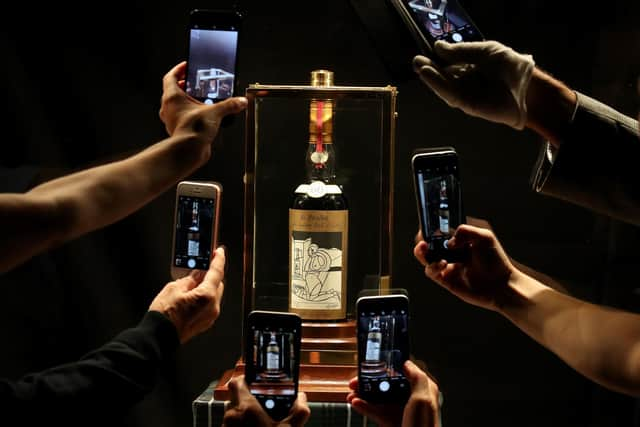How I discovered the real value of money after blowing hundreds on oysters and wine – Kate Copstick
This has been an unsettling week for me. My own fault, really. I shouldn't look at things online. The world, it would seem, is going to hell in a badly constructed handbasket. Flights to Rwanda are all but cleared for take off, Dame Edna is dead and Vera is ending after series 14. But to read part of our own Fourth Estate describe The Blue Nile as a “little known Scottish music act” is disappointing. To say the least.
Their mention was in yet another spread devoted to Taylor Swift, compared to whom, it would seem, the choir of heavenly angels itself is a “little known music act”. As I mentioned last week, front-row tickets for her Wembley gig are changing hands for £6,000. Which got me thinking about the whole ‘price of everything and the value of nothing’ concept. Which goes far beyond, pace Oscar Wilde, mere cynicism.
Advertisement
Hide AdAdvertisement
Hide AdMoney is a deeply worrying thing. The more you learn about it, the more worrying it gets. It started as a means to replace the barter system, became 'commodity money', which had value because of the precious metals the coins were made from, and then 'representative money' which has no intrinsic value but is based on what it represents – eg because it was backed by the 'gold standard'.
But even representative money was abandoned globally in 1971. Now then… are you starting to get worried here? Because I am. The end of representative money left us with fiat money. Fiat meaning trust. So this is money that is worth what you trust it to be worth. Sorry, you will just have to excuse me for a moment while I hoot with uncontrollable and derisive laughter. And then have a panic attack.
Screaming in terror?
Fiat money does not possess intrinsic value nor is it backed by commodities. Its value is determined by supply and demand. It is worth what the Men in Expensive Suits say it is, basically. It is also, I am reassured by Investopaedia, “backed by the credit-worthiness of the issuing government”. But largely controlled by the banks. And the economic forecast puts sterling on course to be worth about four sheets of damp Andrex, strength-wise.


Are you not now screaming in terror? Because I am. So £6,000 for a couple of hours of Taylor Swift which then disappears into nothing but memory... who is to say how we should judge that as a fair exchange? The law of supply and demand dictates that it is the going rate. And we are all – right down (or, indeed, up) to our national economy itself – at the mercy of the law of supply and demand.
So where does that leave us in judging what we should expect to be able to do with our money? What we should feel happy about spending it on. What is VFM? I speak as someone who, with a dear friend, in a previous life, spent an entire day in Alistair Little's eponymous London restaurant consuming almost £300 'worth' of oysters and Chablis. And felt full, but very happy.
Saved from rape, abuse and worse
Last month, I was in Kenya, in areas of the country which are pretty comprehensively strangers to Disney's “problem free… philosopheee”. There, with the help of four amazing local ladies we spent £6,000 on new, safe, happy lives for 1,928 women and girls, plus 191 babes in arms. Women and girls who had been facing violent abuse, rape, FGM, forced early marriage and worse. We relocated them to areas of their own choice, funded business start-ups for them and made sure the girls were enrolled in school.
Near Nairobi, we rescued 72 teenage girls from being forced into prostitution, relocated them safely and (with some wonderful help) got them back into education. In another part of the country, we raised eight raincatchers, each of which bring fresh water to a community of 65 people, on average, and have wiped out waterborne disease in the area. And, just to remind you, the bill was £6,000.
Of course, I could also have bought one 15th of a bottle of 78-year-old Macallan Single Malt, although the £6,000 would not have allowed me to sniff the cork on a 1926 Macallan, sold last year for £2.7 million. I might even be able to rent a one-bedroomed flat in Edinburgh, during the Fringe. No, I joke, of course I couldn't. But that is another problem. For another day.
Advertisement
Hide AdAdvertisement
Hide AdParallel universes
Doing what I do in Kenya with charity Mama Biashara has altered my ideas of value. For, I believe, the better. Does that sound smug? Now I recoil from price tags and eye any restaurant menu with horror before hissing “do you KNOW what I could do with this amount of money in Kenya?” As you might imagine, I have little or no social life.
Intellectually, of course, I know such comparisons are odious, or, arguably, even invalid. But. It seems that, in some ways, money is made and spent in parallel universes that can never have any kind of comprehensible exchange rate. But surely at some point we should – or at least could – consider the worth of what we spend our money on? And, by that, I suppose I mean 'Worth'.
With Mama Biashara, that pretty much equates to saving a life – or enjoying one third of an afternoon tea at the Signet Library. Ooh, decisions, decisions!
Kate Copstick is the founder of women's charity Mama Biashara and a writer
Comments
Want to join the conversation? Please or to comment on this article.
